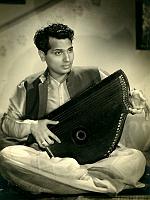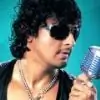|  "Once in 1954, during my days in Calcutta as a radio artist I went to attend a concert of the great Kesarbai with tremendous enthusiasm. I had bought ten tickets worth twenty-five rupees. I had given away the tickets to the other nine who were to join me at the venue. As luck would have it I had misplaced my ticket, but was sure I would have no trouble gaining entry as a well-known radio artist. To my dismay I went not only unrecognised, I was humiliated and also denied entry. All my ardent even tearful pleas to the watchmen, the organisers, etc., went unheard. I even tried telling them who I was but to no avail. Finally Mrs. Som Tiwari (Amma) and the great artist A. Kananji came to my rescue and took me inside. He consoled me saying, that a day would come when Kesarbai herself would hear my singing. "Once in 1954, during my days in Calcutta as a radio artist I went to attend a concert of the great Kesarbai with tremendous enthusiasm. I had bought ten tickets worth twenty-five rupees. I had given away the tickets to the other nine who were to join me at the venue. As luck would have it I had misplaced my ticket, but was sure I would have no trouble gaining entry as a well-known radio artist. To my dismay I went not only unrecognised, I was humiliated and also denied entry. All my ardent even tearful pleas to the watchmen, the organisers, etc., went unheard. I even tried telling them who I was but to no avail. Finally Mrs. Som Tiwari (Amma) and the great artist A. Kananji came to my rescue and took me inside. He consoled me saying, that a day would come when Kesarbai herself would hear my singing.
  After that fate brought Kesarbai and me together in a strange way. In 1970 I was invited to garland Kesarbai and Moghubai Kurdikar at a felicitation function held for them by the Goa Hindu Association. I missed my train and literally ran every step of the way along the railway track from the Grant Road station to the Sahitya Sangh, the venue at Girgaum. As was to be expected I reached late. The crowds had assembled and the function was about to finish. Despite my late arrival when I introduced myself to the watchmen I was respectfully ushered inside. But most of all, to my astonishment my presence was announced and the applause I received then remains unforgettable particularly because I had not received such an applause till then even for my own vocal performance. The formidable Kesarbai not only acknowledged my presence but also, instead of upbraiding me, held my chin and lifting up my face gave me one of my most treasured compliments. She said, "Pandit tum kitne sur me gate ho"(" Pandit, you sing so well."). As was predicted, she had heard my singing albeit over the radio! After that fate brought Kesarbai and me together in a strange way. In 1970 I was invited to garland Kesarbai and Moghubai Kurdikar at a felicitation function held for them by the Goa Hindu Association. I missed my train and literally ran every step of the way along the railway track from the Grant Road station to the Sahitya Sangh, the venue at Girgaum. As was to be expected I reached late. The crowds had assembled and the function was about to finish. Despite my late arrival when I introduced myself to the watchmen I was respectfully ushered inside. But most of all, to my astonishment my presence was announced and the applause I received then remains unforgettable particularly because I had not received such an applause till then even for my own vocal performance. The formidable Kesarbai not only acknowledged my presence but also, instead of upbraiding me, held my chin and lifting up my face gave me one of my most treasured compliments. She said, "Pandit tum kitne sur me gate ho"(" Pandit, you sing so well."). As was predicted, she had heard my singing albeit over the radio!
 "Pandit Omkarnath Thakur has always filled me with deep admiration. On one occasion, I as a junior was scheduled to sing as mere filler, between two great artists and in front of an illustrious gathering including Ustad Bade Ghulam Ali Khan, Ustad Amanat Ali-Fateh Ali, Prasun, Meera Banerji, Nasir Ahmed Khan and A.T. Kanan. When my turn came, the crowd began to shuffle and disperse for a break. That's when Omkarnathji thundered in and announced to one and all, "Mujhe is balak ka gaana sunna hai" (I wish to hear this lad sing). The crowd followed suit. After my recital Panditji asked me whose son I was. On my answer he exclaimed, " Sher ke bete ho" (You are a lion's cub!). After that initial meeting where I was given the recognition I needed most at the time, Omkarnathji continued treating me with great paternal affection." "Pandit Omkarnath Thakur has always filled me with deep admiration. On one occasion, I as a junior was scheduled to sing as mere filler, between two great artists and in front of an illustrious gathering including Ustad Bade Ghulam Ali Khan, Ustad Amanat Ali-Fateh Ali, Prasun, Meera Banerji, Nasir Ahmed Khan and A.T. Kanan. When my turn came, the crowd began to shuffle and disperse for a break. That's when Omkarnathji thundered in and announced to one and all, "Mujhe is balak ka gaana sunna hai" (I wish to hear this lad sing). The crowd followed suit. After my recital Panditji asked me whose son I was. On my answer he exclaimed, " Sher ke bete ho" (You are a lion's cub!). After that initial meeting where I was given the recognition I needed most at the time, Omkarnathji continued treating me with great paternal affection."
 "Ustad Bade Ghulam Ali Khan, much revered by me, once offered to make me his disciple. He was very persuasive but unfortunately I had to decline because I had a tradition to uphold, which was like a tacit promise I had made to my musical ancestry by being born into the Mewati Gharana." "Ustad Bade Ghulam Ali Khan, much revered by me, once offered to make me his disciple. He was very persuasive but unfortunately I had to decline because I had a tradition to uphold, which was like a tacit promise I had made to my musical ancestry by being born into the Mewati Gharana."
 "On 4th December I was to perform at Rishi Valley on the invitation of the great philosopher and teacher Shri J. Krishnamoorti. At the very outset I was warned not to take offence if my host does not remain at the concert after an hour. I was also told in no uncertain terms that he does not like anyone to touch his feet. "On 4th December I was to perform at Rishi Valley on the invitation of the great philosopher and teacher Shri J. Krishnamoorti. At the very outset I was warned not to take offence if my host does not remain at the concert after an hour. I was also told in no uncertain terms that he does not like anyone to touch his feet.
 I sang for forty-five minutes and was mentally prepared that Shri Krishnamoorti would soon rise to leave. Instead he sat on and listened. Another forty-five minutes later he took leave. After interval and I continued as before, singing for the rest of the audience. Appa Jalgaonkar, who was accompanying me on the harmonium, seemed uncomfortable as he kept shuffling. Being a big built man I thought he needed more space and so I moved more to my right trying to make room for him. I soon realised he was really trying to draw my attention towards a pillar where he had seen Shri Krishnamoorti standing and listening. Then I noticed that Shri Krishnamoorti had almost sat down by the pillar. I kept on singing while he slowly returned to his original seat. When I was about to wrap up the concert he requested me to sing more. "Sing something in Sanskrit" he said. And so I did. Thus, what was supposed to have lasted for an odd hour turned out to be a marathon four-hour concert for the great man himself. At the end of it, when I went to touch his feet he hugged me and said, "Your place is here" indicating his heart and said, " I wish we had met earlier." I sang for forty-five minutes and was mentally prepared that Shri Krishnamoorti would soon rise to leave. Instead he sat on and listened. Another forty-five minutes later he took leave. After interval and I continued as before, singing for the rest of the audience. Appa Jalgaonkar, who was accompanying me on the harmonium, seemed uncomfortable as he kept shuffling. Being a big built man I thought he needed more space and so I moved more to my right trying to make room for him. I soon realised he was really trying to draw my attention towards a pillar where he had seen Shri Krishnamoorti standing and listening. Then I noticed that Shri Krishnamoorti had almost sat down by the pillar. I kept on singing while he slowly returned to his original seat. When I was about to wrap up the concert he requested me to sing more. "Sing something in Sanskrit" he said. And so I did. Thus, what was supposed to have lasted for an odd hour turned out to be a marathon four-hour concert for the great man himself. At the end of it, when I went to touch his feet he hugged me and said, "Your place is here" indicating his heart and said, " I wish we had met earlier."
 "This was In 1968.One day I was sitting on the banks of the Ganga at Rishikesh, watching the river flow by. At just one spot close to me I heard the river flow with a kind of 'quiver', like a sort of musical ornamentation. I immediately recognised it as a natural Gamak. From that moment onwards my style naturally took on the subtlety of a flowing river." "This was In 1968.One day I was sitting on the banks of the Ganga at Rishikesh, watching the river flow by. At just one spot close to me I heard the river flow with a kind of 'quiver', like a sort of musical ornamentation. I immediately recognised it as a natural Gamak. From that moment onwards my style naturally took on the subtlety of a flowing river."
 "For me music exists really at a deeper level of consciousness...The total silence of the deep sea is essential. You can't talk about it, you can only feel it to know what the real thing is" "For me music exists really at a deeper level of consciousness...The total silence of the deep sea is essential. You can't talk about it, you can only feel it to know what the real thing is"
 "Very often I have received musical instructions through dreams. Bandishes, sometimes only the Asthai or just the Antara has been passed on to me in sleep. My wife Madhura has been awakened many a night to take down the words or notations I had dreamt of. Having a photographic memory for musical sound I have always managed to recall these dreams perfectly." "Very often I have received musical instructions through dreams. Bandishes, sometimes only the Asthai or just the Antara has been passed on to me in sleep. My wife Madhura has been awakened many a night to take down the words or notations I had dreamt of. Having a photographic memory for musical sound I have always managed to recall these dreams perfectly."
  Very recently, on 22.4.99, after my concert in Tampa I returned to my room all alone. No sooner had I stepped in I heard a voice emanating from around me. It was as if the walls were singing... resounding with the one word "Hey Kanha". I kept following it around the room, singing after the voice. Thus the whole bandish in raga Shankara unfolded, leading me along..."He Kanha...Tum par beeti jo beeti, Hampar beeti so kahi na jai...Ham jani tum jaaye pachtaye, Phir bhi prabhu kahaaye, Ham to rank hoon na ban pai." Very recently, on 22.4.99, after my concert in Tampa I returned to my room all alone. No sooner had I stepped in I heard a voice emanating from around me. It was as if the walls were singing... resounding with the one word "Hey Kanha". I kept following it around the room, singing after the voice. Thus the whole bandish in raga Shankara unfolded, leading me along..."He Kanha...Tum par beeti jo beeti, Hampar beeti so kahi na jai...Ham jani tum jaaye pachtaye, Phir bhi prabhu kahaaye, Ham to rank hoon na ban pai."
 "I think that my relationship with God does not need the rigour of ritual. I will always sing in praise of Him and my music is really my aradhana. Mai swaron se ishwar ko saadhne ki chesta karta hoon (I try to reach God through my music.)" "I think that my relationship with God does not need the rigour of ritual. I will always sing in praise of Him and my music is really my aradhana. Mai swaron se ishwar ko saadhne ki chesta karta hoon (I try to reach God through my music.)"
 "I always begin with OM to free myself from the environment. The first few moments are always difficult and you can dive into the ocean of music only with a prayer." "I always begin with OM to free myself from the environment. The first few moments are always difficult and you can dive into the ocean of music only with a prayer."
 "I believe music is not something you can perfect even in a lifetime. With every life you start off from where you left off in your previous life. Once you have understood this, age is no more a barrier and death is not the end of your musical pilgrimage." "I believe music is not something you can perfect even in a lifetime. With every life you start off from where you left off in your previous life. Once you have understood this, age is no more a barrier and death is not the end of your musical pilgrimage."
| 





 Down the corridors of time...lie indelible experiences strewn across nearly seven decades... glistening pearls of wisdom. Which sometimes bring on a smile or a tear...recalling moments of wordless wonder or deep despair but never to be forgotten, because it is both, the joys and the sorrows, that have chiseled the life of a man who is the chosen instrument of God. For that is just what the Lord Krishna once said to Panditji in a dream: Jasraj, you must sing. Sing for me. Your prayers reach me faster on the wings of your music!
Down the corridors of time...lie indelible experiences strewn across nearly seven decades... glistening pearls of wisdom. Which sometimes bring on a smile or a tear...recalling moments of wordless wonder or deep despair but never to be forgotten, because it is both, the joys and the sorrows, that have chiseled the life of a man who is the chosen instrument of God. For that is just what the Lord Krishna once said to Panditji in a dream: Jasraj, you must sing. Sing for me. Your prayers reach me faster on the wings of your music!
 After that fate brought Kesarbai and me together in a strange way. In 1970 I was invited to garland Kesarbai and Moghubai Kurdikar at a felicitation function held for them by the Goa Hindu Association. I missed my train and literally ran every step of the way along the railway track from the Grant Road station to the Sahitya Sangh, the venue at Girgaum. As was to be expected I reached late. The crowds had assembled and the function was about to finish. Despite my late arrival when I introduced myself to the watchmen I was respectfully ushered inside. But most of all, to my astonishment my presence was announced and the applause I received then remains unforgettable particularly because I had not received such an applause till then even for my own vocal performance. The formidable Kesarbai not only acknowledged my presence but also, instead of upbraiding me, held my chin and lifting up my face gave me one of my most treasured compliments. She said, "Pandit tum kitne sur me gate ho"(" Pandit, you sing so well."). As was predicted, she had heard my singing albeit over the radio!
After that fate brought Kesarbai and me together in a strange way. In 1970 I was invited to garland Kesarbai and Moghubai Kurdikar at a felicitation function held for them by the Goa Hindu Association. I missed my train and literally ran every step of the way along the railway track from the Grant Road station to the Sahitya Sangh, the venue at Girgaum. As was to be expected I reached late. The crowds had assembled and the function was about to finish. Despite my late arrival when I introduced myself to the watchmen I was respectfully ushered inside. But most of all, to my astonishment my presence was announced and the applause I received then remains unforgettable particularly because I had not received such an applause till then even for my own vocal performance. The formidable Kesarbai not only acknowledged my presence but also, instead of upbraiding me, held my chin and lifting up my face gave me one of my most treasured compliments. She said, "Pandit tum kitne sur me gate ho"(" Pandit, you sing so well."). As was predicted, she had heard my singing albeit over the radio! I sang for forty-five minutes and was mentally prepared that Shri Krishnamoorti would soon rise to leave. Instead he sat on and listened. Another forty-five minutes later he took leave. After interval and I continued as before, singing for the rest of the audience. Appa Jalgaonkar, who was accompanying me on the harmonium, seemed uncomfortable as he kept shuffling. Being a big built man I thought he needed more space and so I moved more to my right trying to make room for him. I soon realised he was really trying to draw my attention towards a pillar where he had seen Shri Krishnamoorti standing and listening. Then I noticed that Shri Krishnamoorti had almost sat down by the pillar. I kept on singing while he slowly returned to his original seat. When I was about to wrap up the concert he requested me to sing more. "Sing something in Sanskrit" he said. And so I did. Thus, what was supposed to have lasted for an odd hour turned out to be a marathon four-hour concert for the great man himself. At the end of it, when I went to touch his feet he hugged me and said, "Your place is here" indicating his heart and said, " I wish we had met earlier."
I sang for forty-five minutes and was mentally prepared that Shri Krishnamoorti would soon rise to leave. Instead he sat on and listened. Another forty-five minutes later he took leave. After interval and I continued as before, singing for the rest of the audience. Appa Jalgaonkar, who was accompanying me on the harmonium, seemed uncomfortable as he kept shuffling. Being a big built man I thought he needed more space and so I moved more to my right trying to make room for him. I soon realised he was really trying to draw my attention towards a pillar where he had seen Shri Krishnamoorti standing and listening. Then I noticed that Shri Krishnamoorti had almost sat down by the pillar. I kept on singing while he slowly returned to his original seat. When I was about to wrap up the concert he requested me to sing more. "Sing something in Sanskrit" he said. And so I did. Thus, what was supposed to have lasted for an odd hour turned out to be a marathon four-hour concert for the great man himself. At the end of it, when I went to touch his feet he hugged me and said, "Your place is here" indicating his heart and said, " I wish we had met earlier."


































